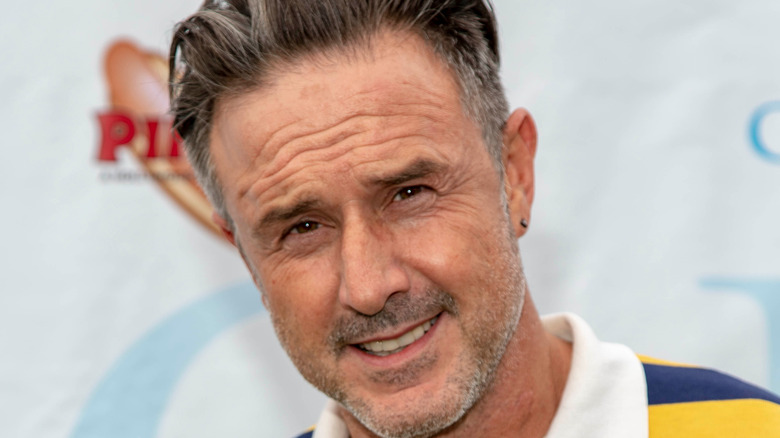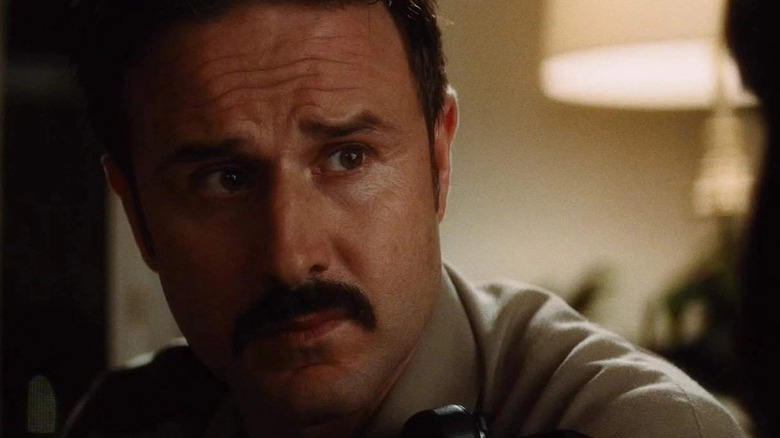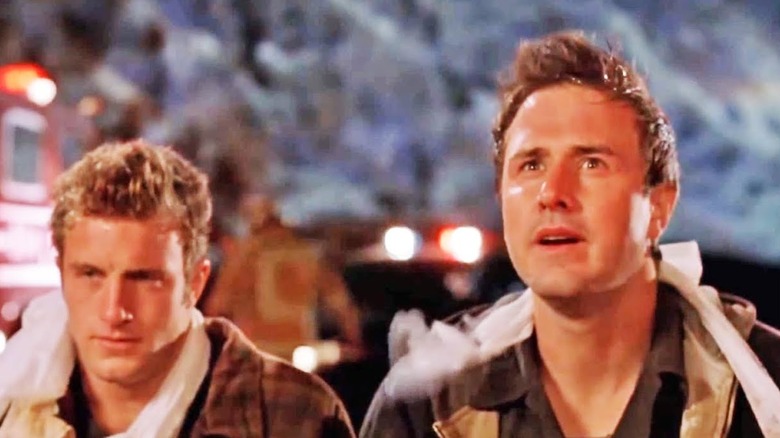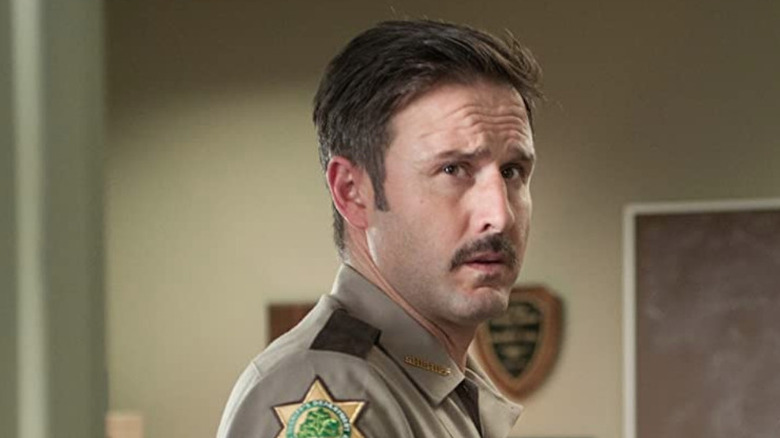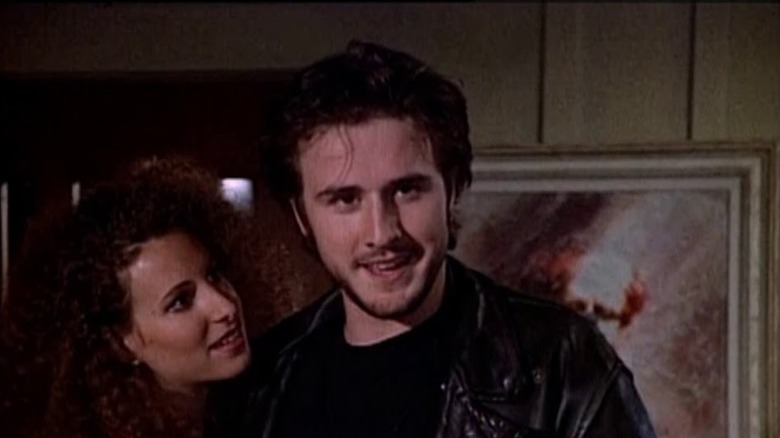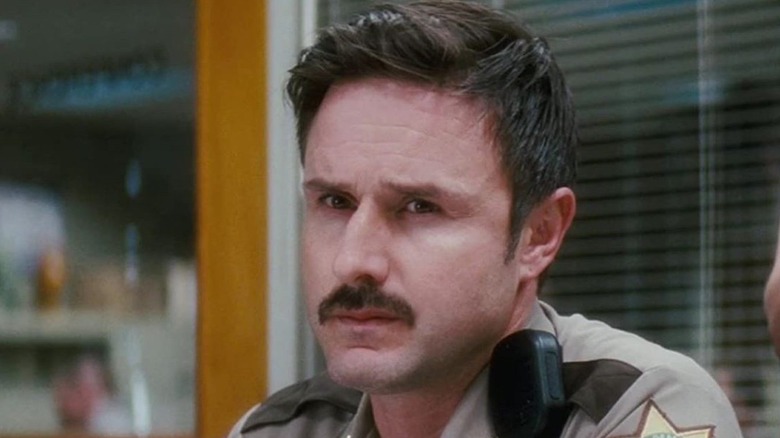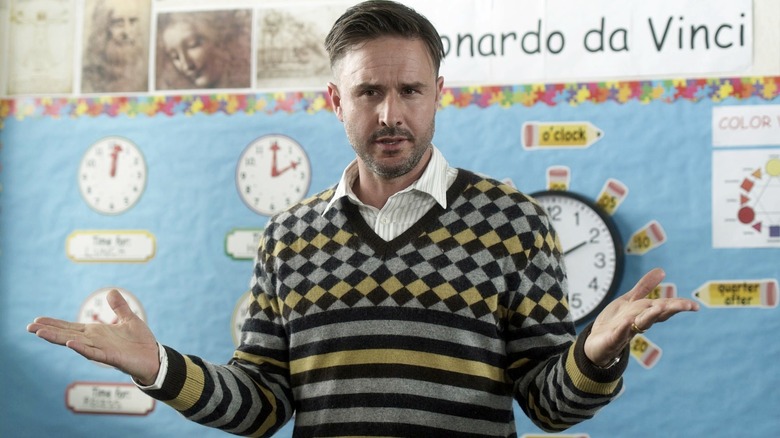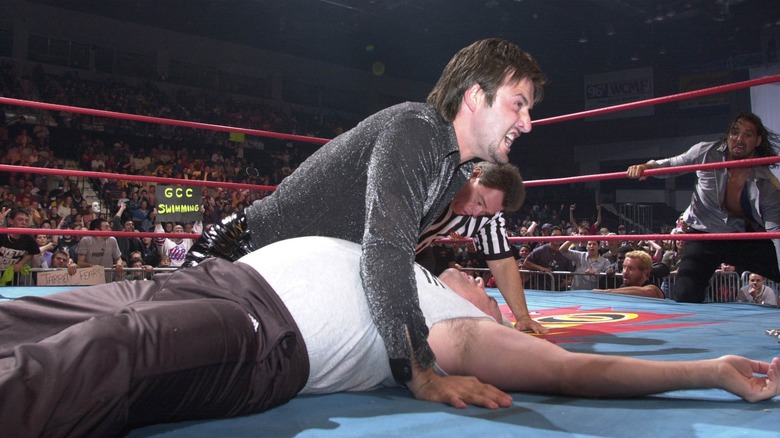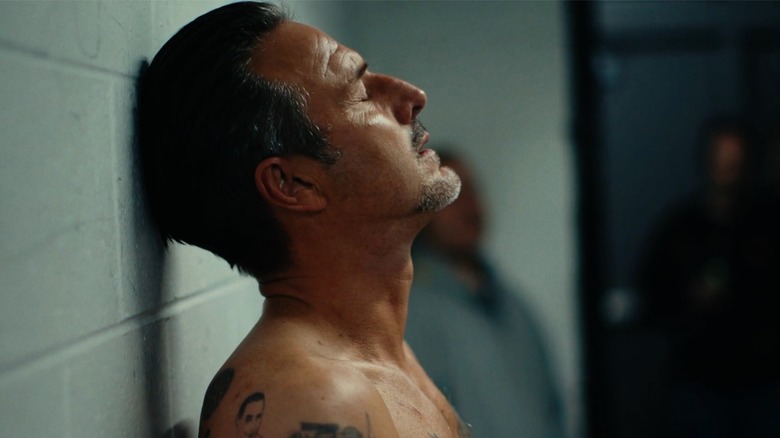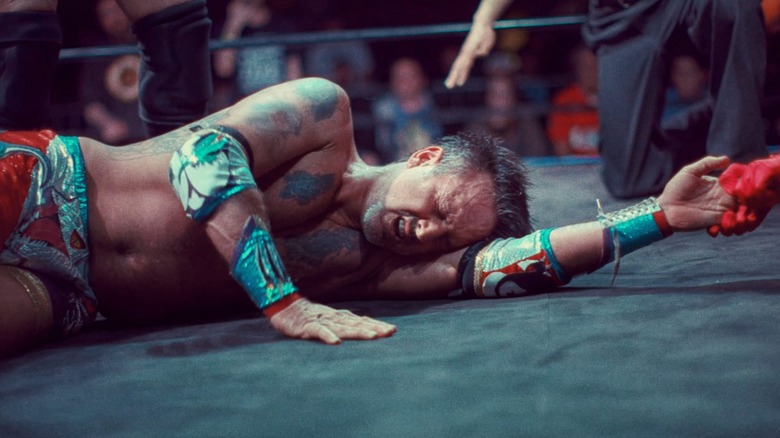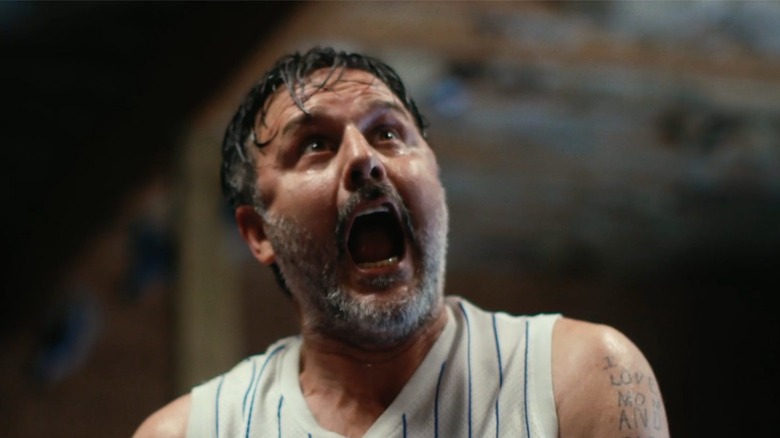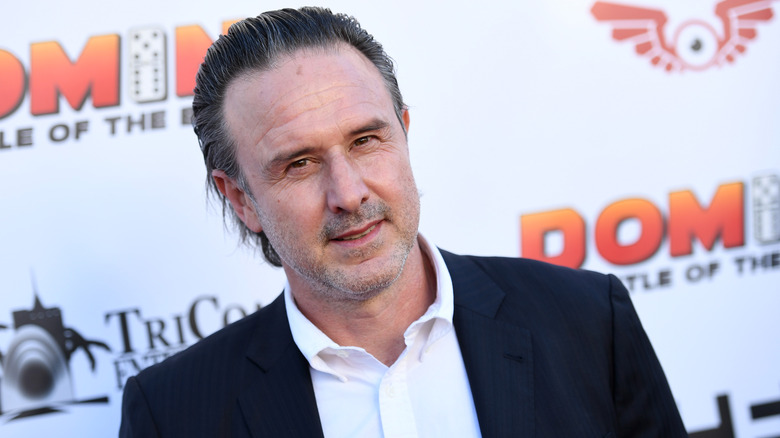The Untold Truth Of David Arquette
David Arquette stands in an especially unique position among Hollywood stars. Both of his parents were performers — and, in fact, his family's interest in acting goes back multiple generations — but Arquette himself was slow in coming around to the craft. When he finally decided to pursue acting as a career, he excelled and became one of the breakout stars of the '90s.
Arquette will always be remembered as Dewey Riley from the "Scream" franchise, but he's lent his talents to more than a hundred different roles. Not content to limit himself to acting, Arquette has chased other dreams (like professional wrestling) that might have curtailed his Hollywood prospects — but that's never bothered him much. Arquette is someone who remains unapologetically true to himself, and he's never been shy about sharing that self with others. His 2020 documentary "You Cannot Kill David Arquette" offers a stunningly intimate portrait of his life and personal struggles.
From film stardom to wrestling infamy, through a rough childhood and adult struggles with addiction, Arquette has continually maintained a positive outlook on life and a dedication to making other people smile. You've seen him for decades in the "Scream" universe. Now discover his untold truth.
David Arquette is a fourth generation actor
Acting is in David Arquette's blood. He comes from a long line of performers, starting with his great grandparents, who were the famed vaudeville duo the Funny Hebrew and the Singing Soubrette (via The Ringer). Arquette's grandfather Cliff was a comedian who performed under the name Charley Weaver. Before having a family, his father managed the Second City theater in Chicago, and he continued to work as an actor and puppeteer well after he and his wife relocated to Hollywood. Even Arquette's mother, Brenda Denaut, was involved in show business as a burlesque dancer and actor in her younger years.
Mardi and Lewis Arquette passed on their passion for performance to all of their children. Arquette's older siblings -– Richmond, Rosanna, Patricia, and Alexis -– began acting careers of their own when they were young adults. All of them have spent the majority of their lives working in front of a camera. Arquette himself has three children who might yet carry the acting tradition into a fifth generation.
He was born in a commune
David Arquette spent most of his childhood growing up in a "crazy part of Hollywood" in the 1980s. His father was a working actor who was much further from success than his children would eventually be. "If there was an actor's strike we had to get food stamps," Arquette told The Ringer. He emphasized the rough neighborhood the family lived in, telling a story about the time a gang burned their house down because they mistakenly believed an ex-member lived there.
Despite not living the high life, the family's situation in Hollywood was probably much more comfortable than it had been when Arquette was born. In the late 1960s, Arquette's mother and father were enticed by the hippie lifestyle, so much so that they decided to relocate from Chicago to a commune in rural Virginia (via The Guardian). Arquette was born at the commune, but the family moved to Hollywood not long after his birth. His older siblings are the only ones with clear memories of life in Virginia. His sister Rosanna once described life there in a conversation with Oprah Winfrey, saying, "[There was] no electricity, no bathroom. I don't think there was running water, even." Hollywood may have been rough in the '80s, but at least they could turn on the tap.
His mother was abusive
Growing up, the Arquette children had more than just a bohemian lifestyle and a rough neighborhood to contend with. Their father spent much of his time involved with his work and struggled with alcoholism. Their mother was physically abusive, especially toward David's older siblings, which his sisters opened up about in an interview with Oprah Winfrey. "She choked me to the point once where I started blacking out," said Patricia Arquette, the middle child of the family. Their oldest sister, Rosanna, may have seen the worst of the abusive. "She stabbed me in the arm with a knife. Concussions. Just terrible, terrible physical abuse."
David Arquette had a complicated relationship with his parents, particularly his mother. "My mother was one of the most loving, sweet angelic people, but she was abusive to us," he told The Guardian. He stayed close with both his parents in spite of the difficulties of his childhood. Part of the closeness is likely due to the one thing the entire family shared –- a real love for performing -– but to hear him tell it, the elder Arquettes also spent their entire lives working to get better. "The beautiful story about that sad background is that my parents healed themselves throughout their life," he told Winfrey. "My father got sober. My mother became a marriage family counselor."
If you or someone you know is dealing with domestic abuse, you can call the National Domestic Violence Hotline at 1−800−799−7233. You can also find more information, resources, and support at their website.
He decided to become an actor in high school
It may have seemed inevitable that David Arquette would pursue acting. His mother had once been a performer, and his father was a working actor all his life. Before Arquette left high school, his three older sisters had already embarked on their acting careers — but he didn't have an immediate desire to pick up the family craft. He spent a good portion of his childhood more focused on misbehaving than acting and even ran around with a graffiti crew that called themselves "The Kids Gone Bad (KGB)."
Arquette didn't want to be ushered into the world of acting, but he wasn't able to escape a genuine enjoyment for the work. As a sophomore at Fairfax High, he auditioned for the school play and secured the lead role. Not long after that, he won second place in a state drama competition and started coming around to the idea that he loved acting and could manage to break into the industry on his own. "I was like, maybe there is something here, and it's not just nepotism," he told The Ringer. In 1990, he joined the cast of two network shows, first "The Outsiders" then "Parenthood," and his acting career was officially off the ground.
Aquette began struggling with drugs and alcohol early in life
David Arquette has been remarkably open about his history with drugs and alcohol. It's no secret that addiction can run in families, and Arquette's father not only struggled with alcoholism, but also inadvertently gave Arquette his first opportunity to experiment with drugs. "I stole pot from my father when I was eight years old," he admitted in an interview with Oprah Winfrey. That early curiosity started becoming a dangerous habit when alcohol got involved. "I seriously started drinking when I was about twelve."
Of course, plenty of teens give drinking and even drugs a try without any disastrous consequences. Arquette says that his substance use didn't become a problem for him and his relationships until much later. "I got really into drugs before I got serious with Courtney [Cox, Arquette's first wife]." Arquette's mother died in 1997, and that trauma spurred his drug use to dangerous levels. "It was the first time that I really used that to numb the feelings I was having and not face any of the reality I was going through."
Arquette's substance abuse was a source of tension in his relationship with Cox. "It was something that scared her early on in our relationship," he said. The couple managed to work through the tension for well over a decade and had a daughter, Coco, in 2004. Eventually, though, Arquette's addiction took its toll. They separated in 2010, and Arquette began seeking treatment.
If you or anyone you know is struggling with addiction issues, help is available. Visit the Substance Abuse and Mental Health Services Administration website or contact SAMHSA's National Helpline at 1-800-662-HELP (4357).
He's found his own path to recovery
Many people think addiction recovery involves entirely giving up drugs and alcohol. The truth is often messier, though, and David Arquette is a living example who's been more than willing to share his experience of recovery with the world. In 2011, Arquette spoke with Oprah Winfrey about staying sober and using yoga and meditation to give himself some peace.
Almost a decade later, Arquette had a more nuanced understanding of himself and his recovery. "I've been sober for long periods of time. I've gone through programs. I've examined what works and what doesn't for me," he told People. He admitted that he sometimes smokes marijuana because it "helps me with my moodiness." He even has the occasional drink. "Addiction is different for everyone, and a lot of people frown on what I'm saying," Arquette said, adding, "I understand if people will judge me for that, but I'm trying to live my life the best I can." He said that he's "never been a full-on sober person" but the fact that he feels good about himself, has managed to rebuild a stable life, and is a happily married father of three speaks volumes about where he's at in his recovery.
David Arquette was the WCW world heavyweight champion
In 2000, David Arquette starred in a wrestling-themed comedy called "Ready to Rumble." As a lifelong fan of the sport, Arquette was thrilled when World Championship Wrestling — whose wrestlers were prominently featured in the movie — reached out and invited him to take part in some events to promote his film and WCW (via The Guardian). What happened next changed his life forever.
At some point, WCW decided that he would win their World Heavyweight Championship as a promotional stunt. Fans revolted — and when WCW, which had been struggling long before Arquette got involved, went bankrupt less than a year after Arquette briefly held the title, he took the brunt of the blame. "For twenty years I would go to matches, and people would spit on me," Arquette told The Sun.
"And it's not like he exploited it," said professional wrestler Diamond Dallas Page, while mourning Arquette's fate in the wrestling world during an interview with The Ringer. "He donated his WCW salary to the then recently paralyzed Darren Drozdov and to the families of the late Owen Hart and Brian Pillman." Still, nothing Arquette did at the time managed to redeem the WCW stunt, which also damaged his Hollywood prospects at the time. It took nearly twenty years for Arquette to properly address the grievances of wrestling fans.
A near-death experience motivated his return to wrestling
David Arquette's grandfather and father died from heart problems, and when he was 49, Arquette himself nearly died of a heart attack. Luckily, he managed to get in contact with a doctor in time. They brought him in for an operation to give him two stents in his arteries. Near death experiences often leave people with profound realizations about their lives and fresh motivation to pursue something new. Arquette's experience gave him his own epiphany, but it wasn't what anyone would have expected. He told The Sun, "When I came round from the operation to put in my two stents I turned round to my wife, and I said, 'I have been thinking a lot about wrestling.'"
Arquette decided it was time to return to professional wrestling, and in case his family had any doubts about his determination, he soon decided to install a wrestling ring in his backyard so he could start training properly (via The Guardian). Rather than try to talk him out of it, Arquette's wife Christina pushed aside her misgivings and supported his decision. The two of them became executive producers of the documentary "You Cannot Kill David Arquette," and Christina was heavily involved in editing the film (via ET Online).
His wrestling return became a near-death experience
"You Cannot Kill David Arquette" is an apt title for a documentary chronicling the actor's return to wrestling because he very nearly died while making it. At his first match –- masked, unbilled, and in Tijuana –- Arquette broke two ribs (via The Ringer). That might have scared off any other 50-year-old actor with only moderate amounts of wrestling experience, but Arquette kept at it. Then, in late 2018, he agreed to a deathmatch, which allowed weapons in the ring.
The match — which saw him face deathmatch legend Nick Gage — was captured in the documentary, and it looks as brutal as it sounds. At one point, a shard of broken glass slashed Arquette's neck. "I thought I was dying," he told The Guardian, but when he realized he hadn't punctured a jugular, Arquette decided to step back into the ring. "I wanted to put a button on the match. But, yeah, it was pretty harsh." Harsh enough for five stitches in his neck.
Arquette stills wrestles, but he's beginning to wind things down. He's won respect from fans of the sport he's loved all his life, but he's also realized that their respect wasn't what his return to wrestling was about. "I've been beating myself up for so many years ... Whatever your personal rabbit hole that you go down is, I've just learned through this process that it is about understanding yourself and believing in yourself, telling yourself that you're the greatest."
He wants to make the world a happier place
David Arquette has always been startlingly open about his life and personal struggles. His vulnerability bleeds into the roles he performs and has endeared him to fans through his unorthodox career. At the same time, plenty have been off put or outright baffled by his lack of discretion. That's something Arquette has wrestled with himself. "Sometimes I'm like, ugh, I overshare and I'm too much of an open book," he once told Independent, eventually coming to the conclusion that "it's also part of who I am." As the years go on, Arquette chooses more and more often to lean into that part of himself.
In "You Cannot Kill David Arquette," the actor pulls back the curtain further than ever and bears his soul in a way few people would. Arquette's vulnerability reflects his worldview -– as he told The Sun, "I like life because it's not a perfect pretty box" –- but it's also a very purposeful decision. "I talk about my struggles with addiction and my battles with mental health, mainly to let people know they are not alone." If his work can make people smile, laugh, and feel a sense of love, then Arquette will have accomplished exactly what he set out to do.
Arquette is learning to be a clown
True to form, David Arquette is taking his desire to make people feel less alone to its logical conclusion: Becoming a clown. He revealed on "LIVE with Kelly and Ryan," "I'm studying to be a clown, and I'm working with an amazing organization called Healthy Humor." The group travels to hospitals and performs clown acts for patients who might otherwise struggle to find a reason to smile. Arquette wants to pass some of his contagious joy to others, and he's using the best approach he can think up.
In addition to becoming a clown himself, Arquette is also investing in the legacy of one of the greatest clowns of all time. "It took me fifteen years to secure the rights [to Bozo the Clown]," he told Sharp Magazine. A lifelong fan, Arquette met with Larry Harmon himself — the longtime portrayer of Bozo — and stayed in touch with his family for years before securing the rights to Bozo in the hope of rebooting the clown's legacy.
He's currently developing new songs with his friend Graham Wheeler while also working on a documentary about Bozo. Arquette believes that some of today's struggles can be addressed "through humor, community, and creativity," and he believes Bozo the Clown is the perfect vehicle for those three pillars.
